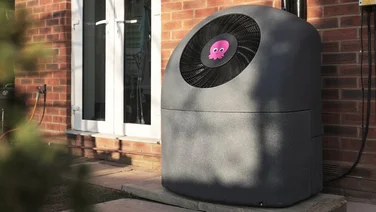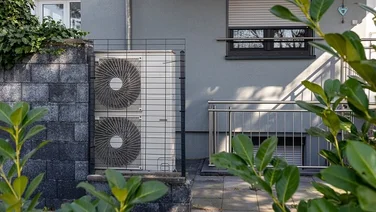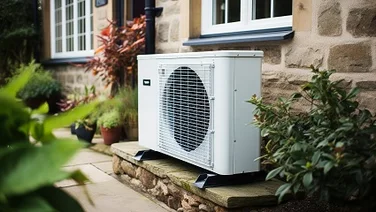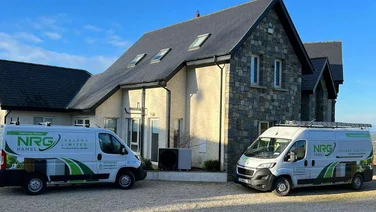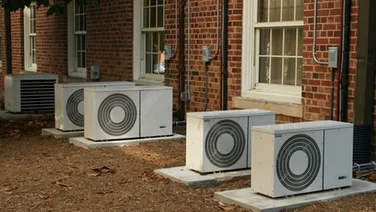✔ The main types of heat pump are air, ground, air-to-air, and water source
✔ Air source heat pumps are the best overall
✔ Water source heat pumps are the most efficient
Found yourself investigating heat pump prices but not sure which type of heat pump is right for you? We can help.
In this guide, we’ll go through the four most common types of heat pumps – air source heat pumps, ground source heat pumps, water source heat pumps, and air-to-air heat pumps – as well as other kinds that might suit you better.
We’ll explain their main differences, costs, efficiency ratings, and lifespans, so you can make an informed choice about which type is right for your needs.
If you’re ready to buy your chosen type of heat pump, just fill in this form and our trusted installers will be in touch with free quotes.
What type of central heating do you currently use?
Get started
What are the 4 types of heat pump?
The four types of heat pump are air source heat pumps, ground source heat pumps, water source heat pumps, and air-to-air heat pumps.
All of these heat pumps come with their own advantages and disadvantages, and will make sense for some homes and not others.
To give you a quick summary, here’s how each heat pump performs in terms of its cost, efficiency, lifespan – and whether it’s currently available to buy.
| Type of heat pump | Average Cost | Efficiency (%) | Lifespan (years) | Commercially available? |
|---|---|---|---|---|
Air source | £10,000 | 300 | 20 | Yes |
Ground source | £24,000 | 350 | 20 | Yes |
Water source | £10,000 | 450 | 20-25 | Yes |
Air-to-air | £2,350 | 300 | 20 | Yes |
Air source heat pumps
Type of heat pump | Cost | Efficiency (%) | Lifespan (years) | Commercially available? |
|---|---|---|---|---|
Air source | £10,000 | 300 | 20 | Yes |
Air source heat pumps draw warmth from the air outside your home, use that to heat up a refrigerant liquid, pass the resulting gas through a compressor to increase its temperature, and send it to heat up your home’s hot water supply.
While a standard gas boiler has 95% efficiency, air source heat pumps work at 300% efficiency, because the air’s warmth contributes most of the energy.
Air source heat pumps even work at temperatures as low as -25°C, but usually see a significant fall in their efficiency during winters.
They cost £10,000 on average, and you may have to upgrade your insulation and/or radiators. However, the Boiler Upgrade Scheme can save you £7,500, and you’ll save £4,891 over the lifespan of your heat pump, compared to a gas boiler.
An air source heat pump will cut your carbon footprint and future-proof your home against gas boiler bans – plus there are government grants that can cut your costs.
- £7,500 off with the Boiler Upgrade Scheme
- You’ll save money over its lifespan
- Cut your carbon footprint
- Future-proof your home against boiler bans
- £10,000 upfront cost without grants
- You may need to upgrade insulation & radiators
- They work worse in winter
Ground source heat pump
Type of heat pump | Cost | Efficiency (%) | Lifespan (years) | Commercially available? |
|---|---|---|---|---|
Ground source | £24,000 | 350 | 20 | Yes |
A ground source heat pump works in the same way as its air source sibling, except it draws warmth from under the ground, which means it’s more consistent and efficient.
It does however require a more invasive process, whether you go for a vertical or horizontal installation.
The average three-bedroom household will need around 400m² of ground to fit a horizontal system’s pipes, while a vertical installation requires boreholes to be drilled anywhere from 80 and 160 metres down into the earth.
This explains why it’s more expensive than other types of heat pump. A horizontal installation costs £24,000, on average, while the vertical version typically comes to £49,000.
This upfront cost means you’ll almost always spend more overall than you would with a gas boiler – though you can at least use the Boiler Upgrade Scheme to cut its price by £7,500.
- £7,500 off with the Boiler Upgrade Scheme
- Underground pipes should last for 70 years
- Cut your carbon footprint
- Consistent year-round level of heat
- Most expensive heat pump type by far
- Needs a large area of land
Water source heat pump
Type of heat pump | Cost | Efficiency (%) | Lifespan (years) | Commercially available? |
|---|---|---|---|---|
Water source | £10,000 | 450 | 20-25 | Yes |
A water source heat pump absorbs warmth from nearby bodies of water like lakes, rivers, streams, mine water, sea water, and aquifers.
Water source heat pumps are even more efficient than their ground or air source counterparts – reaching 300-600% – because heat transfers better through water.
They’re consistent too, as water temperatures are stable throughout the year in the UK – averaging between 7°C-12°C – which is also warmer than the average air and ground temperature.
At around £10,000, they’re priced similarly to air source heat pumps – and you can get a £7,500 discount if your installer uses the Boiler Upgrade Scheme.
- More consistent than other heat pumps
- Usually more efficient
- Cheaper than other types with the Boiler Upgrade Scheme
- Longer lifespan
- Requires a nearby body of water
Air-to-air heat pump
Type of heat pump | Cost | Efficiency (%) | Lifespan (years) | Commercially available? |
|---|---|---|---|---|
Air-to-air | £2,350 | 300 | 20 | Yes |
Air-to-air heat pumps work like air source heat pumps, except they don’t send the hot air they generate to heat up your water supply – they simply blow it out into your home.
They can also circulate cold air in summer, making them ideal for the increasingly extreme weather we’re experiencing.
However, they don’t supply hot water to your showers or taps, meaning you’ll need a separate system for those functions, such as an electric water heater, or a heat pump hot water heater.
But if you already have one, you can cut out gas and rely exclusively on electricity to heat and cool your home.
- Provides space heating & cooling
- Costs less than other types
- Massively cuts your gas usage
- Doesn’t provide hot water
- No grants available

Other types of heat pump
There are a few other types of heat pump that are currently less popular, but may suit your home better.
High temperature heat pumps
High temperature heat pumps can heat your home up as quickly as a gas boiler can, meaning you won’t need to install any new insulation or radiators.
They reach these higher temperatures by using a superior refrigerant, which also allows them to operate at roughly the same efficiency level as regular heat pumps.
You’ll typically pay £11,000 for a high temperature model, which is more than most heat pumps – but you won’t have to purchase any other home improvement measures.
Roof-mounted heat pumps
This concept is new, but may be the future of heat pumps.
In 2022, home builders Bellway installed the first roof-mounted heat pump in the UK, inside the loft of the company’s Energy House 2.0.
This eco-friendly model home, which is part of Salford University’s Future Home project, will be monitored to see how the heat pump performs compared to a wall-mounted unit.
If it works just as well, you’ll soon see homeowners following suit, as a roof-mounted heat pump doesn’t change the appearance of the outside of a property.
Hybrid heat pumps
A hybrid heat pump is built to be used alongside another source of heat.
For instance, you could combine a hybrid air source heat pump with a ground source heat pump, so you’ll definitely have a reliable source of warmth during winter.
Or you could combine a hybrid heat pump with a gas or oil boiler, which can be more convenient if you already have one.
Which type of heat pump is best for you?
There are a few factors you should consider when deciding which type of heat pump is best for you.
When it comes to efficiency, water source heat pumps stand out above the rest. They range from 300%-600%, while other types usually hit 300% or so, with a few exceptions reaching 450%.
The best heat pump in terms of cost is the air-to-air heat pump. They’re much cheaper than other types, just as efficient as an air or ground source heat pump – and though they don’t provide hot water, they can be used in conjunction with a boiler.
The best type of heat pump overall is the water source heat pump, as it’s 4.5 times more efficient than a gas boiler while costing just £2,500 with a Boiler Upgrade Scheme grant – the same price as a boiler.
However, if you don’t have a body of water near your home, we’d recommend getting an air source heat pump. They provide hot water for a reasonable price and minimal disruption.
Heat pump running costs
A ground source heat pump’s running costs for a three-bedroom household will typically come to around £939 per year.
The average air source heat pump will cost about the same, though this can vary significantly, depending on where you live in the UK.
| Heating method | Efficiency (%) | Annual energy use (kWh) | Cost (p/kWh) | Annual bill |
|---|---|---|---|---|
| Gas boiler | 95 | 11,500 | 6.04 | £694 |
| Heat pump | 300 | 3,833 | 24.50 | £939 |
| Oil boiler | 92 | 11,875 | 11.14 | £1,337 |
| Electric boiler | 100 | 10,925 | 24.50 | £2,676 |
Next steps
You now have all the information you need to choose between all the different types of heat pumps. The future of this industry is bright, especially with the Heat Training Grant currently creating a new generation of heat pump engineers.
The next step is to get some quotes from the best heat pump installers.
Want an easy way to find the perfect heat pump for your home? Just pop some details into our quick quote tool, we’ll put you in touch with our trusted heat pump installers.
FAQs
What are the types of heat pump technology?
There are three types of heat pump technology: air, ground, and water source.
Among these types, there are differences in efficiency, price, and capabilities – but in basic terms, all heat pumps fit into one of these three categories.
Which heat pump type is the most common?
Air source heat pumps are the most common type of heat pump in the UK.
More than 160,000 Microgeneration Certification Scheme-certified air source heat pumps have been installed across the country, compared to just 30,000 other types of heat pump.
What is the difference between a ground source heat pump and air source heat pump?
A ground source heat pump takes geothermal heat from under the ground, while an air source heat pump draws on the heat in the air – all the way down to -25°C, in many cases.
Ground source heat pumps are usually significantly more expensive because they require a complex installation involving either digging up around 400m² of earth or drilling down 80-160 metres.


